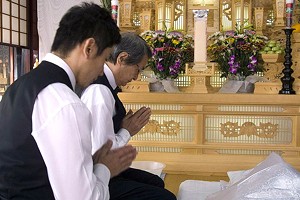Published July 22, 2009 at 7:36 a.m.
This year’s Oscars broadcast was short on surprises. No one streaked past the host. Roberto Benigni did not clamber over the seat in front of him and trample A-listers on his way to the podium. In fact, the show’s most shocking moment probably came when it was announced that the award for Best Foreign Language Film would go not to Waltz With Bashir — as had been widely assumed — but to the relatively low-profile Japanese nominee, Departures.
Certainly American viewers were dumbfounded, since the only people on this side of the pond who’d seen the movie at the time were Academy members provided with award-consideration screeners. In Japan, however, the picture was one of 2008’s biggest hits and had already snagged an impressive 10 statuettes at that country’s version of the Oscars.
I’d be the first to agree that Bashir is a far more challenging, groundbreaking work, and to admit that I had my money on it. But the truth is that the two films are cinematic apples and oranges. On its own terms, Departures is a thing of rare and remarkable beauty.
Masahiro Motoki, who achieved pop-star status in his native country as a boy-band singer, displays his considerable acting chops as Daigo, a thirtysomething cellist whose Tokyo-based symphony orchestra is dissolved early in the story. Faced with the fact that he lacks sufficient talent to find work in a more successful ensemble, he and his plucky wife, Mika (Ryoko Hirosue), decide to move to the mountains of rural Japan and live in the home his mother left him.
The movie’s core joke involves Daigo spotting a help-wanted ad in which the word “departures” prominently features. “No experience required,” it reads. “Short working hours.” Surmising the business is a travel agency, he stops in the following day to apply. Two unexpected developments ensue: First, the owner, Mr. Sasaki (veteran actor Tsutomu Yamazaki), sits Daigo down, chucks his résumé to one side and hires the stunned young man on the spot at a whopping salary. Second, he explains that the newspaper ad contained a misprint. It should have read not “working with departures” but “working with the departed.”
Mr. Sasaki’s business, we abruptly learn, deals with a very special kind of travel — journeys not to exotic locales but to the soul’s final destination. Director Yojiro Takita and screenwriter Kundo Koyama don’t speculate at any length on what that might be. Their focus is earthbound, on the body that’s been vacated, the family left behind and an ancient ritual that prepares all parties for the next stop — the furnace of the crematorium.
Under his new employer, Daigo learns the art of encoffinment, a tender, gracefully choreographed process of cleansing, making up and enrobing bodies that’s equal parts sacred rite and theatrical production. Several such procedures are performed in the course of the picture, and I’ve got to be honest: I found them more spellbinding than the splashiest special effect in any of the summer’s blockbusters. It’s easy to comprehend the peace that watching the process brings to the bereaved.
The script also assists us in grasping the husband’s reasons for not divulging the true nature of his new gig to his wife. While the culture’s caste system is supposedly a thing of the past, certain prejudices live on, and one of the most resilient is a traditional revulsion toward anyone whose living brings him or her in contact with the dead. Several hometown friends shun Daigo, and eventually word does reach Mika, leading to another sort of departure.
Based on the novel Coffinman, by Shinmon Aoki, the film offers a moving rumination on the link between the living and the dead, along with a fascinating portrait of life in rural Japan and traditions gradually being discarded by the young. It’s also funny as hell in places. One of my favorite scenes involves the first encoffinment the apprentice performs. “She’s beautiful,” Daigo whispers over his shoulder to his boss. Moments later, as he ritually washes the body beneath elaborate garments, his eyes widen. “She has a thing!” Typical of Takita’s repeated deft shifts between the somber and the comic, the scene culminates with the suicide’s father realizing tearfully and too late that, until the young man’s death, he’d never really lost the son he loved.
Which brings me to a Code Red hankie alert. Be forewarned: Departures tugs at the heartstrings as skillfully as Daigo bows the strings of his cello. In particular, anyone who has lost a parent is likely to mist up more than once. If the grieving families and plaintive score by Joe (Howl’s Moving Castle) Hisahishi don’t get you, the picture’s last-minute twist is guaranteed to nail your blubber button. At the same time, the characters are so likable and the story ultimately so uplifting that Takita succeeds in turning a tale about the business of death into the feel-good movie of the summer. It may or may not have deserved that Oscar, but there’s no question it deserves to be seen.
Info:
More By This Author
Speaking of Movies, movie Review
-

Next Month Brings the Final Curtain for Palace 9 Cinemas
Oct 27, 2023 -

Book Review: 'Save Me a Seat! A Life With Movies,' Rick Winston
Aug 30, 2023 -

Steve MacQueen Named Executive Director of Vermont International Film Festival
May 22, 2023 -

Vermonters Are Going Back to the Movies — Under the Stars
Aug 26, 2020 -

Where to Catch a Movie Near Burlington
Sep 11, 2018 - More »
Comments
Comments are closed.
From 2014-2020, Seven Days allowed readers to comment on all stories posted on our website. While we've appreciated the suggestions and insights, right now Seven Days is prioritizing our core mission — producing high-quality, responsible local journalism — over moderating online debates between readers.
To criticize, correct or praise our reporting, please send us a letter to the editor or send us a tip. We’ll check it out and report the results.
Online comments may return when we have better tech tools for managing them. Thanks for reading.















































